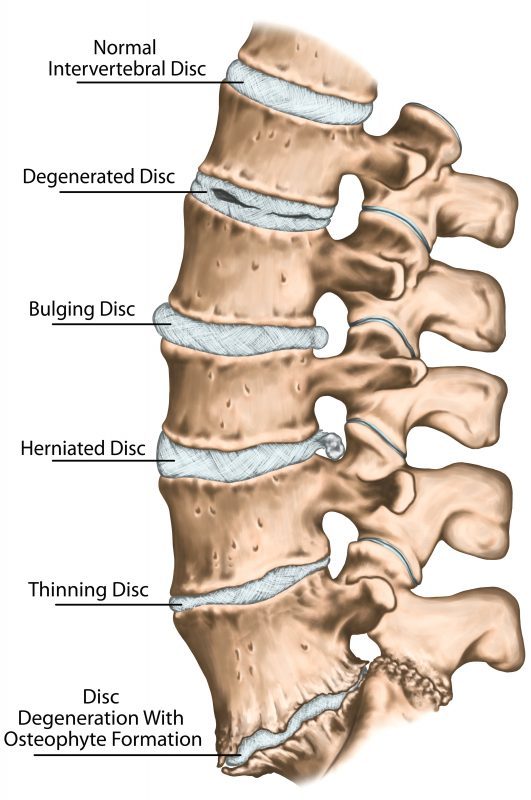When battling the pain related to intervertebral disc degeneration, patients have few good options.
It’s one of the main causes of chronic lower back pain and is a major public health problem, but could the answer for intervertebral disc degeneration lie with cannabis?
Intervertebral disc degeneration occurs when the discs that separate the vertebrae in the spine start to break down. With the cushioning system separating vertebrae degenerating, there is less protection for vertebrae. This results in a decreased ability to absorb pressure which can lead to pressure on the spinal cord. It can also lead to pain, numbness, weakness, bone spur growth, and even problems with walking and bowel and bladder control over time.
The onset of this degeneration is largely thought to be due to genetic and environmental factors. Variations to collagen genes seem to play a large role. This is due to the large collagen content in intervertebral discs. Other genes, with links to the development and maintenance of intervertebral discs and immune function, are also thought to possibly initiate intervertebral disc degeneration. Non-genetic factors may include smoking, obesity, sedentary lifestyle, chronic inflammation, and aging.
Could CBD Help Treat Intervertebral Disc Disease Damage?
A study, published in PLOS One (2014), looked into the possible therapeutic benefits of treating intervertebral disc generation with CBD. The compound, also known as cannabidiol, is an active cannabinoid found in cannabis plants. CBD activates non-cannabinoid receptors and modulates other receptor pathways in order to induce its effects on the body. CBD is a non-intoxicant, so consuming it as an extract will induce zero intoxicating effects.
The animal study injected CBD into the site of intervertebral disc degeneration of rats. This degeneration was the result of a single needle puncture of CBD treatment doses at varying levels of 20, 60, or 120 nano-mol. The sites of degeneration were then analyzed by MRI after two days, with the 120 nano-mol dose group having further MRI and histological analysis after fifteen days.
The results showed that at the two-day analysis, treatment with 30 and 60 nano-mol CBD did not affect degeneration. However, the 120 nano-mol dose was able to significantly improve intervertebral disc lesions. The results at fifteen days showed that the significant improvement to disc lesions from CBD treatment was evident. Histological results after fifteen days also showed that 120 nano-mol CBD treatment prevented histological changes in Annulus Fibrosus tissue and corroborated the results of MRI analysis.
The study concluded that CBD possesses potential anti-degenerative action and is a promising candidate for use as a disc degeneration treatment. Further research is necessary before doctors recommend it for humans.

Does CBD Have Anti-inflammatory Capabilities?
There are suspicions that inflammation plays a key role in intervertebral disc degeneration, with an up-regulation of inflammatory factors seen. These inflammatory factors alter the homeostasis of the extracellular matrix, causing a degenerative state and the breakdown of disc components.
CBD has shown significant potential as an anti-inflammatory, which may be one of its mechanisms of action on intervertebral disc degeneration. One animal study, published in the Journal of Experimental Medicine (2012), found that CBD’s anti-inflammatory action may work through its targeting of specific glycine receptors. The study suggests that CBD managed to enhance the expression of the glycine receptor GlyR. This receptor type can mediate the glycinergic cannabinoid-induced suppression of inflammation.
Another study, published in the Journal of Clinical Investigation (2014), found that when application of CBD to human sebocytes occurs, it demonstrates anti-inflammatory activity that happens through the A2a adenosine receptor. This then upregulates TRIB3. TRIB3 suppresses inflammation pathways by blocking inflammatory proteins and transcription factors. Another 2014 study from the Journal of the American Society of Nephrology also found that CBD inhibited the signaling of NF-kB, a transcription factor involved in inflammatory responses.
CBD’s Pain Relieving Qualities
Pain is a common complaint from intervertebral disc degeneration patients. So, any treatment helping with pain levels is welcome news to those suffering from symptoms, such as lower back pain.
Luckily, CBD offers treatment potential in this area too.
CBD is now in use as a pain-reliever in a number of countries. It is becoming more well known for its analgesic properties. One method of CBD’s pain-relieving effects apparently occurs through its action on serotonin receptors. Serotonin is a neurotransmitter with links to pain reduction and CBD has demonstrated its ability to bind to and activate serotonin receptors, leading to an increase in serotonin levels. One 2018 study from the Journal of Headache and Pain even found that CBD mediated activation of the serotonin receptor 5-HT1A. This activation led to a cellular cascade and inhibitory response that resulted in the reduction of pain perception.
What Does this Mean for Intervertebral Disc Disease
While the study involving CBD treatment of disc degeneration is promising, CBD is far from a cure-all.
What it does offer is a potential therapeutic treatment for patients that is safe and non-intoxicating. Patients with intervertebral disc degeneration may find that CBD treatment works well alongside other treatment options. Or maybe they just prefer it to the high-risk pain-killers. These are often prescribed to individuals with lower back pain or other disc-degenerative related pain. As with any treatment option, it is best to seek advice from your doctor before taking any medical action.






Fiona Mcmahon
Hi I live in Perth, West Australia. I have a Pars defect, causing severe osteoarthritis. I also had 4 small tumours from my l.breast removed almost a year ago.. I also am a type 2 diabetic on insulin. Can you please recommend the best way I can get this treatment Thankyou